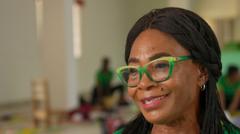In Nigeria, neonatal jaundice is a prevalent yet treatable condition that can lead to cerebral palsy if not addressed. The Cerebral Palsy Centre in Lagos, founded by Nonye Nweke, offers critical support for affected children like Babatunde. With few facilities available and significant stigma surrounding congenital disorders, efforts by projects like Oscar aim to enhance medical resources to prevent these disabilities.
Combating Neonatal Jaundice: A Mother's Crusade Against Cerebral Palsy in Nigeria

Combating Neonatal Jaundice: A Mother's Crusade Against Cerebral Palsy in Nigeria
A dedicated mother's initiative seeks to address the link between untreated neonatal jaundice and cerebral palsy, aiming to improve healthcare and awareness in Nigeria.
A mother's unwavering commitment is making waves in Nigeria's healthcare landscape, focusing on the critical link between untreated neonatal jaundice and cerebral palsy. Babatunde Fashola, affectionately called Baba, is a 22-year-old young man living with cerebral palsy, requiring dedicated lifelong care. Abandoned by his parents as a baby, he has found solace and support at the Cerebral Palsy Centre in Lagos for the last decade. Here, Nonye Nweke, the founder of the center, and her devoted staff provide round-the-clock care for Baba and other children facing similar challenges.
Cerebral palsy is alarmingly common in Nigeria, with estimates suggesting around 700,000 individuals affected. A key contributor to this statistic is the high incidence of neonatal jaundice, a condition resulting from an excess of bilirubin in newborns. While most cases are manageable with timely treatment, approximately 60% of all babies in Nigeria exhibit some level of jaundice, complicating the healthcare landscape significantly.
Professor Chinyere Ezeaka, a pediatrician, emphasizes that early intervention is crucial. Treatments, typically involving exposure to ultraviolet light to breakdown high bilirubin levels, can prevent lasting damage if administered within the first ten days of life. Unfortunately, many affected infants do not receive the necessary care in Nigeria, which leads to permanent brain damage and conditions like cerebral palsy. The World Health Organization has identified Nigeria as one of the five nations with the highest rates of neurological disorders linked to untreated jaundice.
With just three privately-run cerebral palsy centers in a country of over 200 million people, the demand for services far exceeds supply. Nweke’s center operates solely on donations and currently accommodates 12 children, although it has a waiting list of over 100 applications. Each child's care costs around $1,000 monthly, presenting a significant challenge given the national minimum wage is roughly $540 per year.
Reflecting on her journey, Nweke recounts the pain of not finding a daycare for her adopted daughter, Zimuzo, due to stigma surrounding disabilities, which are often believed to be the result of spiritual affliction in Nigeria. This stigma leads to tragic outcomes, including abandonment and ostracization of affected children.
Working alongside Nweke is the Oscar Project, an initiative launched to enhance the diagnosis and treatment for neonatal jaundice. Backed by consumer health firm Reckitt, this project is equipping healthcare facilities with essential tools and training health workers to screen and treat jaundice effectively, aiming to reach 10,000 mothers in its first year.
Despite facing daunting challenges, including an overstretched public health system and the pervasive stigma against disabilities, advocates like Nweke and the Oscar Project are determined to improve awareness and access to treatment, ensuring that no child suffers from the preventable consequences of untreated neonatal jaundice.


















